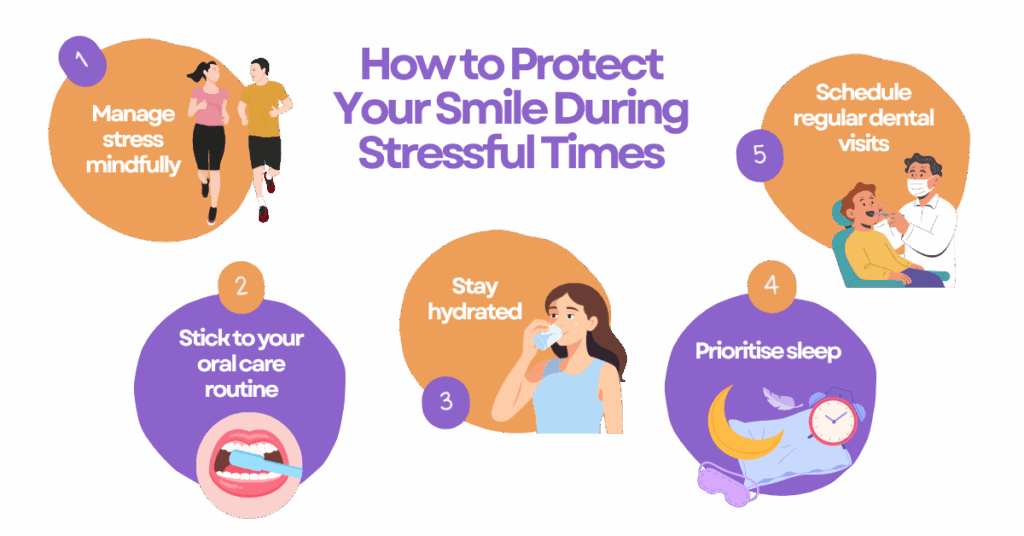Article reviewed by:
Dr Tan Kian Meng • Prosthodontist

Every October, World Mental Health Day shines a spotlight on mental health, inspiring education, awareness, and action worldwide. While we often think about mental health in terms of mood, focus, or productivity, one area is frequently overlooked – how our emotional state can affect our oral health.
The connection between mental and dental health is more profound than many realise. Chronic stress, anxiety, and sleep problems can quietly take a toll on your mouth. Let’s explore how emotional health and oral health are linked, and what you can do to protect both your mind and your smile.
Table of Contents
Are You Feeling Stretched and Stressed Out?
While stress is a normal physiological response to life’s challenges, chronic stress can trigger real physical changes within the body. One of the most common oral signs of stress is none other than bruxism.
- Many people clench or grind their teeth unconsciously during stressful moments or in their sleep.
- Over time, this can cause worn enamel, jaw pain, and even cracked teeth.
- In some cases, this repetitive strain may lead to temporomandibular joint (TMJ) disorder, a condition affecting the jaw joint that can cause pain, stiffness, clicking sounds, and even headaches or facial tension.
Prolonged stress can also suppress immune function, making it harder for your body to fight bacterial infections effectively. As a result, you may notice:
- Increased gum inflammation
- Mouth ulcers
- Higher risk of gum disease (periodontitis)
In short, when your mind is under pressure, your mouth often feels it too.
To learn more, read our article on Understanding and Treating Bruxism.
Sleep Well, Smile Better
Quality sleep is the foundation of good health, and your oral health is no exception. When you don’t get enough quality rest, your body’s repair and immune functions slow down.
Poor sleep can contribute to:
- Dry mouth: Reduced saliva flow increases the risk of cavities and bad breath.
- Weakened immunity: Your gums become more prone to inflammation and infection.
- Sleep bruxism: Grinding and clenching often occur during disrupted sleep patterns.
For some individuals, conditions like sleep apnea can also play a role. Sleep apnea reduces oxygen flow and may lead to morning headaches, dry mouth, and jaw discomfort, all of which can impact your oral health and quality of life.
Another often-overlooked condition linked to disrupted sleep is GERD (gastroesophageal reflux disease). When stomach acid flows back into the mouth during sleep, it can erode tooth enamel over time, leading to sensitivity, cavities, or a sour taste upon waking. Managing GERD not only supports your digestive health but also protects your teeth from acid damage.
If you suspect sleep apnea or GERD, consult your dental specialist or doctor for evaluation and management – both conditions can significantly impact your oral and overall wellbeing.
Your Mood Steers Your Routine
Our emotions can influence our daily choices, and those little habits can add up, including how well we care for our teeth and gums. When you’re stressed or anxious, it’s easy to:
- Skip brushing and flossing before bed
- Reach for sugary comfort foods or drinks
- Increase caffeine or alcohol intake, both of which dry the mouth
- Bite nails or chew on objects (a subconscious stress outlet)
These small habits can add up, leading to plaque buildup, cavities, and enamel wear.
Be mindful of these behaviours and give yourself grace when stress hits. This is the first step to breaking the cycle and protecting your smile.
The Mind-Smile Connection
Research has highlighted a strong bi-directional link between mental health and oral health.
- People with chronic anxiety or depression are more likely to experience oral conditions like gum disease, dry mouth, or tooth loss.
- Conversely, poor oral health can lower self-esteem and confidence, feeding back into emotional distress.
Taking care of your emotional wellbeing is not only good for your heart and mind, it’s essential for your smile too.
How to Protect Your Smile During Stressful Times

Here are practical ways to support your emotional and oral health together:
- Manage stress mindfully: try meditation, exercise, deep breathing, or journaling — whatever helps you unwind.
- Stick to your oral care routine: even on stressful days, brushing twice and flossing once can prevent long-term damage.
- Stay hydrated: drinking water helps maintain saliva flow and rinses away bacteria.
- Prioritise sleep: try to accumulate 7 – 8 hours of restful sleep each night. To support better digestion and reduce acid reflux, avoid lying down immediately after meals and allow at least 2–3 hours before going to bed.
- Schedule regular dental visits: your dental specialist can spot early signs of stress-related damage such as grinding or gum inflammation.
Final Thoughts
Your smile reflects more than just your dental care. It mirrors your lifestyle, stress levels, and emotional health. A calm mind and a healthy mouth go hand in hand.
Whenever life feels overwhelming, take a moment to breathe and unwind. A peaceful mind goes hand in hand with a healthy smile.
If you’ve noticed signs of teeth grinding, jaw discomfort, or dry mouth, our team is here to help. Schedule a consultation to learn how you can protect your oral health.
Drop us a text via the WhatsApp icon on the bottom right corner, enquire or call us at (65) 6733 7883.

Dr Tan Kian Meng is a Dental Specialist in Prosthodontics with Specialist Dental Group®. He is also a Clinical Lecturer at the National University of Singapore and Diplomate with the American Board of Prosthodontics. He was formerly a Consultant at Singapore’s Khoo Teck Puat Hospital and Fellow of Maxillofacial Prosthetics and Oncologic Dentistry Fellowship at the University of Texas MD Anderson Cancer Center. Dr Tan has special interest in prosthetic and implant restorative dentistry.







